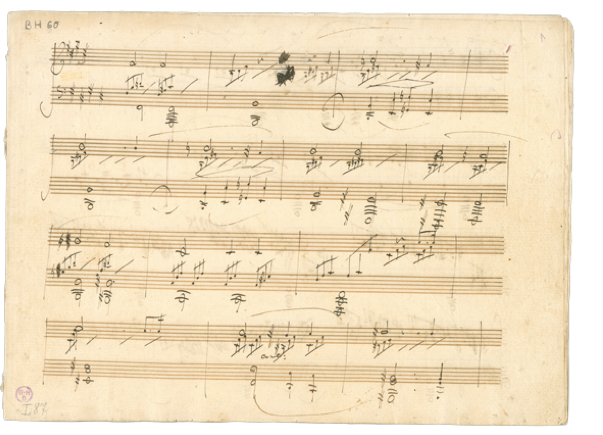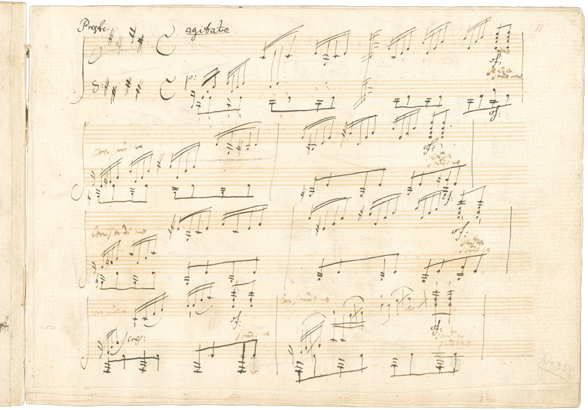räsonanz – Lucerne 2018
Ludwig van Beethoven
1770
Baptism of Ludwig van Beethoven on December 17.
1778
Public appearance as a piano-playing wunderkind on March 26 in Cologne.
1782
First publication: Nine Variations on a March by Dressler (WoO 63). Occasional temporary position as organist in the court chapel, still without salary.
1783
Beethoven dedicates three piano sonatas (WoO 47) to his employer, Elector Maximilian Friedrich.
1784
Permanent position as second court organist.
1786/87
At the end of the year, he travels to Vienna to take lessons from Mozart. Between January and April 1787, Beethoven stays in Vienna for several weeks; a meeting with Mozart is likely, but not documented. On his way home, he learns that his mother is dying.
1789
Beethoven becomes a member of the Bonn court orchestra as a violist.
1790
Funeral cantata for the death of Emperor Joseph II (a brother of the Elector of Bonn, Maximilian Franz), cantata for the coronation of Leopold II. Joseph Haydn visits Bonn on his journey to London and again in 1792 on his return to Vienna; Beethoven is introduced to him.
1792
In November, Beethoven goes to Vienna to become a student of Haydn. Later, he also takes lessons from Albrechtsberger and Salieri.
1794
French troops occupy the Rhineland. The Electorate of Cologne is dissolved, and the Elector flees. Beethoven loses his position in Bonn; what was planned as a training trip to Vienna becomes a permanent move.
1795
On March 29, first public performance in Vienna. Beethoven plays a piano concerto (probably Op. 15) at the Hofburg Theater in an academy organized by Joseph Haydn. In July, Beethoven’s Opus 1 (three piano trios) is printed by subscription.
1796
His only major concert tour: via Prague (February to April), Dresden, and Leipzig to Berlin (May to July).
1798
Piano Sonata Op. 13 “Pathétique.”
1800
On April 2, first concert of his own in Vienna with the premiere of the First Symphony. With this, Beethoven had tackled the third genre of instrumental music influenced by the Viennese classics Haydn and Mozart, following the Piano Sonata (Op. 2, 1795) and the String Quartet (Op. 18, 1798–1800).
1802
“Heiligenstadt Testament” as a resigned monologue about his increasing deafness.
1803
Academy at the Theater an der Wien on April 5: premiere of the Second Symphony, the Third Piano Concerto, and the oratorio “”Christus am Ölberge” (Christ on the Mount of Olives). “Kreutzer Sonata” op. 47.
1804
On April 18, Napoleon proclaims himself Emperor of France. Disappointed by this, Beethoven later rejects the title “Bonaparte” intended for the Third Symphony.
1805
First occupation of Vienna by French troops. The nobility leaves the city. The premiere of the first version of “Fidelio” (“Leonore”) on November 20 is a failure.
1806
From August to October, Beethoven stays with Prince Lichnowsky, an important patron of his, at Grätz Castle (Silesia). He returns to Vienna due to a dispute with Lichnowsky. Premiere of the Violin Concerto. String Quartets, Op. 59, commissioned by Count Rasumowsky.
1807
Mass in C major, Op. 86, for Prince Esterhazy in Eisenstadt.
1808
Academy at the Theater an der Wien on December 22: premiere of the 5th and 6th symphonies, the 4th piano concerto, and the choral fantasy, Op. 80.
1809
Archduke Rudolph, Prince Lobkowitz, and Prince Kinsky guarantee Beethoven an annual pension. In return, he agrees to remain in Vienna and declines the position of court conductor offered to him by Napoleon’s brother Jérome in Kassel. On May 4, the imperial family leaves Vienna due to the renewed French occupation. His farewell to Archduke Rudolph inspires him to compose the Piano Sonata Op. 81a, “The Farewell.”
1810
Play music for Goethe’s “Egmont”.
1812
Cure stay in Teplitz. Letter to the “Immortal Beloved,” whose identity is unknown. Meeting with Johann Wolfgang von Goethe. On the return journey, a longer visit to his brother Johann, who has a pharmacy in Linz.
1813
“Wellington’s Sieg oder Die Schlacht bei Vittoria” (“Wellington’s Victory or The Battle of Vittoria”), Op. 91, premiered on December 8 together with the Seventh Symphony, was composed by Beethoven after one of the decisive victories over Napoleon.
1814
The Congress of Vienna opens in September. The interest of international dignitaries brings Beethoven great success through occasional compositions (the congress cantata “Der glorreiche Augenblick” (“The Glorious Moment”), performances of the 7th and 8th symphonies, and a new version of “Fidelio.”
1815
Probably Beethoven’s last public appearance as a pianist. After the death of his brother Kaspar Karl on November 15, Beethoven becomes guardian of his nephew Karl. In the following years, legal disputes arise with his sister-in-law Johanna van Beethoven over guardianship.
1816
Song cycle “To the Distant Beloved.”
1818
Conversation books become necessary: due to Beethoven’s deafness, people have to communicate with him in writing. “Hammerklavier Sonata” Op. 106.
1820
In March, Archduke Rudolph takes office as Archbishop of Olomouc. Beethoven writes the Missa solemnis for this occasion, but does not complete it until 1823.
1822
The last piano sonata: Op. 111.
1823
“Diabelli Variations”.
1824
May 7: Premiere of the Ninth Symphony. Beethoven then begins work on his last string quartets, central compositions of his late work.
1826
Attempted suicide by his nephew Karl on August 6. Last completed composition: new finale for the String Quartet Op. 130.
1827
Beethoven dies on March 26 in the “Schwarzspanierhaus” in Vienna.
Source: Beethoven-Haus, Bonn




